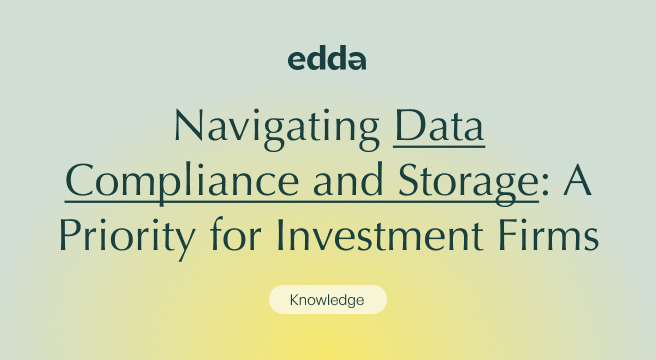In today’s regulatory environment, investment firms, especially those in venture capital and private equity, confront significant challenges related to data compliance and storage.
The introduction of the General Data Protection Regulation (GDPR) in Europe has established stringent requirements for handling sensitive information. For firms with international operations, the imperative is twofold: ensuring strict adherence to these legal standards while also maintaining the confidence of clients and stakeholders.
This dual responsibility demands a sophisticated approach to data management, balancing legal obligations with the practicalities of international business operations.
The Importance of Data Compliance
Investment firms are mandated to comply with various regional and international regulations that set standards for how personal and sensitive data should be handled, stored, and protected.
Different regions have their own data protection laws (like GDPR in Europe, CCPA in California), leaving firms to navigate these diverse and sometimes conflicting regulations. Firms operating globally face the additional challenge of needing to navigate the complexities of cross-border data transfer regulations.
Adapting to multiple legal standards can be resource-intensive and complex, especially for firms with international operations. However, non-compliance risks significant financial penalties, which can be as high as 4% of annual global turnover or €20 million under GDPR. This poses a far greater financial risk to firms.
Furthermore, the risk of internal threats due to unintentional non-compliance increases if employees are not well-trained in data handling.
Data breaches or non-compliance incidents can severely damage a firm’s reputation. Clients are more likely to entrust their investments to firms that demonstrate a commitment to data security, so maintaining strict data protocols helps uphold the firm’s image and client relationships.
Cautionary Tales
Firms have suffered due to insufficient storage or handling of data in the past. For instance, in 2019, Capital One Financial Corp, the U.S.-based bank holding company, suffered a data breach that resulted in the exposure of personal information of over 100 million customers. The breach occurred due to an insecure Amazon Web Services (AWS) S3 bucket that was not configured properly. The incident highlighted the importance of adequate storage and handling of data.
Similarly, in 2018, the financial services firm, Morgan Stanley, suffered a data breach that exposed the personal information of thousands of customers due to inadequate storage and handling of data. The firm failed to ensure that its decommissioned data centers were fully wiped of sensitive information before being sold.
These incidents demonstrate the criticality of effective data storage and handling practices for investment firms or similar institutions. It is essential that they prioritize data security to prevent breaches that can lead to severe consequences for their customers and the organization as a whole.
The Challenge of Storing Data
Investment firms manage sensitive financial data that demands secure storage solutions, which can be complex for firms especially operating across different regions.
In the European Union, the focus on data sovereignty and residency has grown post-GDPR. The preference is increasingly for data to be stored within the EU, impacting cloud storage and data center strategies for investment firms.
To navigate this perplexing regulatory environment, investment firms are seeking data storage solutions that align with regional data protection laws. Key considerations include:
- Adherence to Regional Laws: Ensuring the data storage provider complies with local data protection laws, especially in regions like the EU with strict regulations.
- Data Sovereignty: Verifying the physical location of data storage to ensure compliance with legal requirements.
- Robust Security Protocols: Assessing the security measures of storage solutions to safeguard against data breaches and their potential legal and reputational fallout.
The Role of Technology in Compliance & Data Management
Investment firms today understand the importance of managing data compliance and storage effectively. It not only helps them meet regulatory requirements, but also provides a competitive edge. Through the integration of sophisticated technological systems, companies can enhance their compliance standards and operational efficiency, making it easier for them to attain their objectives.
Advanced data storage and compliance systems, designed to navigate the complex landscape of international data regulations, are essential for streamlining deal flow processes. Such systems enhance the accessibility and precision of information, which is crucial for making timely and informed decisions. This not only boosts operational efficiency but also reinforces the firm’s ability to respond quickly to market changes and opportunities.
Robust data security is at the core of these systems, safeguarding the firm from potential legal challenges and preserving the integrity of operations. By adhering to compliance standards, firms effectively mitigate risks associated with data breaches and cyber-attacks, avoiding legal penalties and significant financial setbacks.
A critical aspect of ensuring compliance is controlling internal access to sensitive data. Monitoring and limiting access to vital information, ensuring it’s available only to authorized personnel, is essential in reducing the risk of internal data breaches. This controlled access aligns with compliance requirements and strengthens the overall data security framework within the organization.
Leveraging Edda’s CRM for Investment Banks
Edda’s top venture capital management software is well-equipped to tackle these challenges effectively. With its all-inclusive data management platform, Edda’s software simplifies the process of complying with different compliance standards, ensuring a smooth and hassle-free experience.
Edda’s features include automated data aggregation, advanced analytics, and customizable access controls, all of which contribute to a robust data security posture. Additionally, Edda’s venture capital software allows for real-time monitoring and reporting, crucial for maintaining transparency and accountability in data handling practices.
Firms that effectively manage data compliance and incorporate it into their venture capital due diligence, particularly those utilizing advanced tools like Edda’s dealflow management software, can leverage this capability as a market differentiator.
In an industry where trust and data security are highly valued, a reputation for robust data management is a significant asset. It attracts discerning clients and investors who prioritize these aspects, enhancing your firm’s investment portfolio and competitive edge.









